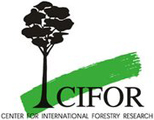 May 2016: The Center for International Forestry Research (CIFOR) of the CIGAR Consortium has shared research findings on REDD+ performance at different scales, as well as mechanisms for benefit-sharing, multi-level governance and land-use incentives. The Center has also circulated briefs on results-based payments for REDD+ and on adaptation-mitigation synergies in the land sector.
May 2016: The Center for International Forestry Research (CIFOR) of the CIGAR Consortium has shared research findings on REDD+ performance at different scales, as well as mechanisms for benefit-sharing, multi-level governance and land-use incentives. The Center has also circulated briefs on results-based payments for REDD+ and on adaptation-mitigation synergies in the land sector.
In a session on ‘Measuring national REDD+ performance for the promise of results-based finance’ organized as a side-event during the Bonn Climate Change Conference, CIFOR researchers presented research findings on the performance of schemes to reduce emissions from deforestation and forest degradation in developing countries, and foster conservation, sustainable management of forests and enhancement of forest carbon stocks (REDD+) at different scales. They also discussed opportunities and challenges, and power and politics in multi-level REDD+ policy arenas as well as the implications for policy and benefit-sharing designs.
The brief, titled ‘A match made in Paris: Adaptation-mitigation synergies in the land sector,’ highlights links between adaptation and mitigation in the 2015 Paris Agreement, the Warsaw REDD+ frameworks and the Green Climate Fund. It underscores that there are many benefits to considering adaptation and mitigation jointly, and calls for further research to elucidate links and trade-offs between mitigation and adaptation.
The brief, titled ‘Results-based payments for REDD+: Lessons on finance, performance, and non-carbon benefits,’ notes that results-based finance will need to consider not only carbon/emissions-related payments, but also incentives for intermediate outputs, such as policy performance, in order to effectively reduce deforestation and forest degradation. It identifies a major gap in the current guidance for REDD+ finance regarding the lack of clear, context-relevant criteria and metrics to help justify and mobilize payments, and calls for understanding the variation in costs and who is bearing the different costs of REDD+ as critical in setting payment levels that can incentivize both carbon-effective and equity outcomes. [Side-event on Measuring National REDD+ Performance] [IISD RS Video Coverage of the Side-event] [CIFOR Global Comparative Study on REDD+] [Publication: A Match Made in Paris: Adaptation-Mitigation Synergies in the Land Sector] [Publication: Results-based Payments for REDD+: Lessons on Finance, Performance, and Non-carbon Benefits]